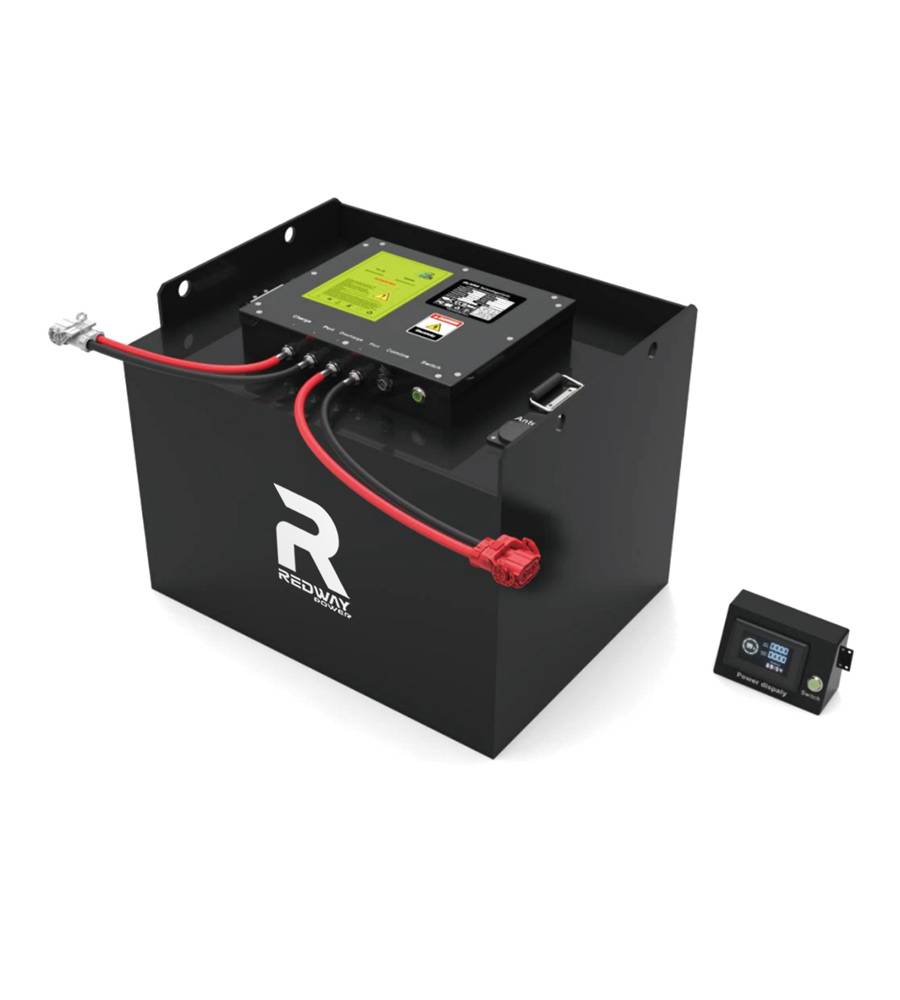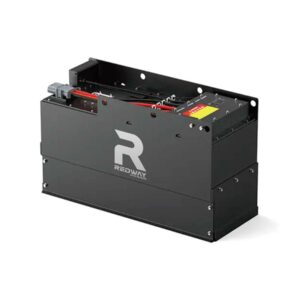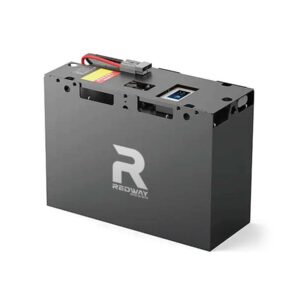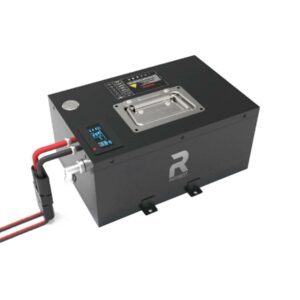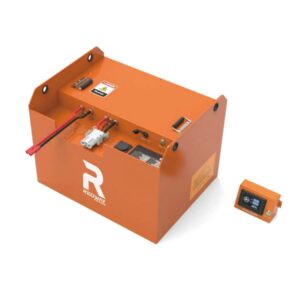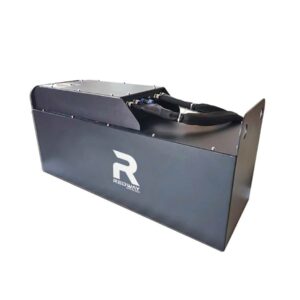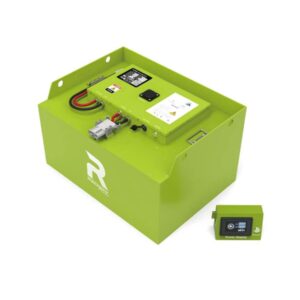Description
Our 48V 460Ah LiFePO4 Forklift Battery is a cutting-edge energy solution engineered for industrial material handling. As a trusted lithium battery manufacturer, we specialize in delivering OEM-ready power systems that enhance operational efficiency, reduce costs, and withstand demanding environments.
Key Features
High Energy Capacity: The 48V/460Ah configuration provides 23.5kWh energy output, enabling uninterrupted operation for extended shifts.
Extended Cycle Life: Achieves over 3,500 cycles at 80% Depth of Discharge (DOD), outperforming lead-acid batteries by 3¨C5x lifespan.
Robust Discharge Performance: Supports 350A continuous and 1000A peak discharge for heavy lifting and high-intensity tasks.
Advanced Safety System: Integrated BMS ensures real-time monitoring of voltage, temperature, and current, with protections against overcharging, short circuits, and thermal risks.
IP67 Durability: Sealed metal casing resists dust, water, and mechanical stress, ideal for harsh warehouse or outdoor use.
Product Description
Designed for OEM integration, the 48V 460Ah LiFePO4 Forklift Battery combines high energy density with rapid charging capabilities. Its compact dimensions (950mm x 421mm x 450mm) and 352kg weight ensure compatibility with standard forklift configurations. The battery operates efficiently in temperatures from -20¡ãC to 60¡ãC, eliminating downtime in extreme conditions.
A dual communication interface (RS485 and CAN-bus) enables seamless fleet management integration, providing operators with real-time data on battery health and performance. Proprietary cell-balancing technology minimizes capacity degradation, while the modular design simplifies maintenance and scalability for large-scale deployments.
Lifespan Advantages Over Lead-Acid Batteries
The lithium LFP chemistry delivers 3,000¨C5,000 cycles, compared to 500¨C1,000 cycles for lead-acid alternatives. This reduces replacement frequency by 70%, lowering long-term ownership costs and minimizing operational disruptions.
Cost Efficiency Analysis
Despite a higher initial investment, the battery reduces total cost of ownership by 20¨C30% through energy savings, zero watering, and elimination of equalization charges. Fast charging (0¨C80% in 2 hours) further cuts downtime-related expenses.
Maintenance-Free Operation
Unlike lead-acid batteries, this lithium solution requires no watering, terminal cleaning, or equalization. The self-monitoring BMS automates health checks, allowing operators to focus on productivity rather than maintenance.
Safety and Compliance
Fire-resistant materials, thermal runaway prevention, and multi-layer electrical protections ensure compliance with industrial safety standards. The IP67 rating guarantees reliability in wet or dusty environments.
Optimization Guidelines
1. Avoid deep discharges below 20% SOC to prolong cycle life.
2. Charge at ambient temperatures between 0¡ãC and 55¡ãC for optimal efficiency.
3. Use manufacturer-approved chargers to maintain warranty coverage.
4. Schedule annual BMS diagnostics to preempt potential issues.
As a leading lithium battery manufacturer, we empower OEM partners with scalable, eco-friendly power solutions tailored to modern logistics challenges. Contact us to explore bulk pricing and custom configurations for your material handling fleet.
48V LFP Forklift Batteries in China
Top 48V LFP forklift battery manufacturers in China?
Some of the leading 48V LFP forklift battery manufacturers in China include CATL, BYD, and Sunwoda. These companies specialize in high-performance lithium iron phosphate (LFP) batteries, which are known for their durability, safety, and efficiency. They offer tailored solutions for industrial applications like forklifts, with advanced Battery Management Systems (BMS) to ensure safety and longevity.
Certifications for Chinese 48V LFP forklift batteries?
Chinese manufacturers of 48V LFP forklift batteries typically hold key certifications such as ISO 9001 (quality management), UL 2054 (safety), and CE (European market compliance). These certifications ensure the batteries meet international standards for safety, performance, and environmental impact. Manufacturers may also obtain UN38.3 certification, which is necessary for safe transportation of lithium-ion batteries.
Advantages of 48V LFP batteries in forklifts?
The key advantages of 48V LFP batteries in forklifts include longer lifespan, faster charging, and improved safety. LFP batteries are more resistant to temperature fluctuations and have a lower risk of thermal runaway compared to other lithium chemistries. They offer consistent power throughout the charge cycle and are highly energy-efficient, reducing operating costs in industrial environments.
Warranty policies for China-made 48V LFP forklift batteries?
Chinese manufacturers of 48V LFP forklift batteries typically offer warranties ranging from 2 to 5 years, depending on the battery’s specifications and the supplier. The warranty usually covers defects in materials and workmanship, and in some cases, it includes coverage for capacity degradation over time. Buyers should review the warranty terms to ensure adequate support throughout the battery’s lifecycle.
How do Chinese 48V LFP battery prices compare globally?
Chinese 48V LFP battery prices are typically more competitive globally due to economies of scale and cost-efficient manufacturing processes. While prices may vary based on factors like capacity, design, and certifications, China remains a leading exporter of lithium-ion batteries, offering lower prices compared to suppliers in North America or Europe. However, quality and service levels should also be considered when evaluating costs.
Export markets for China’s 48V LFP forklift batteries?
China is a major exporter of 48V LFP forklift batteries, with significant demand in Europe, North America, and Southeast Asia. The batteries are used in a range of industries, including material handling, logistics, and warehouse automation. China’s competitive pricing, coupled with its growing reputation for battery quality and advanced technologies, helps secure its position in global markets.
Performance and Maintenance of Lithium Forklift Batteries
How does 460Ah capacity impact forklift performance?
A 460Ah battery capacity in forklifts provides increased operating time and the ability to handle heavier loads without frequent recharging. The larger capacity ensures consistent power output during longer shifts, making it ideal for warehouses or manufacturing environments where uptime is crucial. Forklifts with higher capacity batteries can cover more distance and perform more tasks per charge, improving overall productivity.
Advantages of lithium over lead-acid forklift batteries?
Lithium batteries offer several key advantages over lead-acid batteries, including a longer lifespan, faster charging, and reduced maintenance. Lithium batteries can last up to 5,000 cycles, compared to about 1,000 cycles for lead-acid. They also offer consistent power delivery and are more energy-efficient, providing lower operational costs in the long term despite a higher initial investment.
Charging time for high-capacity lithium forklift batteries?
High-capacity lithium forklift batteries like 460Ah typically require 4 to 6 hours for a full charge using an appropriate charger. Lithium batteries are designed for fast charging compared to traditional lead-acid batteries, making them ideal for round-the-clock operations with minimal downtime. Quick recharges help maintain workflow and keep forklifts ready for use in a busy environment.
Lifespan comparison: lithium vs traditional forklift batteries?
Lithium forklift batteries typically last 3,000 to 5,000 cycles, while traditional lead-acid batteries last about 1,000 cycles. This significant difference in lifespan makes lithium batteries more cost-effective over time, despite their higher upfront cost. Lithium batteries also maintain consistent performance throughout their lifespan, whereas lead-acid batteries experience performance degradation as they age.
Maintenance requirements for 460Ah lithium forklift batteries?
460Ah lithium forklift batteries require minimal maintenance compared to lead-acid alternatives. Basic maintenance includes cleaning terminals, checking the state of charge (SOC), and monitoring the Battery Management System (BMS) for any error codes. It’s also important to keep the battery cool and avoid overcharging or deep discharging to maximize lifespan and efficiency.
Cost-effectiveness of 460Ah lithium batteries long-term?
Although the initial cost of a 460Ah lithium battery is higher than lead-acid, its long lifespan (3,000 to 5,000 cycles), reduced maintenance costs, and improved energy efficiency make it highly cost-effective in the long term. Lithium batteries also require less downtime for charging, offering a better return on investment for businesses that operate forklifts around the clock.
48V Lithium Industrial Battery Performance and Safety
What are key advantages of 48V lithium industrial batteries?
48V lithium industrial batteries offer improved energy efficiency, longer lifespan, and faster charging. These batteries are ideal for industrial applications, providing consistent power output over longer periods and reducing the need for frequent recharging. Additionally, they offer better safety features, including thermal management and Battery Management Systems (BMS), which enhance reliability in demanding environments.
How to ensure safety in 48V lithium battery design?
To ensure safety in 48V lithium battery design, manufacturers integrate multiple safety features, including overcharge protection, thermal management, and Battery Management Systems (BMS). The BMS monitors voltage, current, and temperature to prevent overheating and damage. Additionally, enclosures and fail-safes are designed to protect the cells from mechanical stress or external impact, ensuring the battery operates safely.
What certifications are required for industrial lithium batteries?
Industrial lithium batteries require certifications such as ISO 9001 (quality management), UL 2054 (safety), CE (European standards), and UN38.3 (for safe transport). These certifications ensure the battery meets global safety and performance standards, reducing risks in industrial applications. IEC 62133 certification is also required to confirm safe operation under various environmental conditions.
How does temperature affect 48V lithium battery performance?
Temperature significantly impacts 48V lithium battery performance. Extreme heat can increase the risk of overheating, while very cold temperatures can reduce the battery’s capacity and charging speed. Maintaining a stable operating temperature ensures that the battery delivers optimal performance and prolongs its lifespan. Many high-quality lithium batteries feature thermal management systems to regulate temperature during use.
What maintenance practices extend 48V lithium battery lifespan?
To extend the lifespan of 48V lithium batteries, it’s essential to avoid deep discharges and maintain the state of charge (SOC) between 20% and 80%. Ensure the Battery Management System (BMS) is functioning properly and regularly check for signs of wear or damage. Also, ensure that the battery is stored in a cool, dry environment and avoid exposing it to extreme temperatures.
Can 48V lithium batteries be customized for specific equipment?
Yes, 48V lithium batteries can be customized for specific equipment based on factors like capacity (Ah), size, and power output. Manufacturers can adjust battery configurations to meet the unique demands of different forklifts and material handling equipment, ensuring optimal performance and efficiency. Customization also includes integrating specialized Battery Management Systems (BMS) to suit particular operational needs.
CE Certification and LFP Forklift Battery Safety
What are CE certification requirements for LFP forklift batteries?
CE certification for LFP forklift batteries ensures that the battery complies with European Union safety, health, and environmental protection standards. It requires testing for electrical safety, EMC (electromagnetic compatibility), and chemical safety. The battery must also be equipped with thermal management systems and overcharge protection to meet CE safety standards for industrial equipment.
How do CE-certified LFP batteries enhance forklift safety?
CE-certified LFP batteries enhance forklift safety by ensuring compliance with European standards for electrical and mechanical safety. These batteries are designed with integrated thermal management systems, overcharge protection, and short circuit prevention. Additionally, CE certification verifies that the battery has been rigorously tested for performance and safety, ensuring reliable operation in demanding environments.
What advantages do LFP batteries offer over lead-acid types?
LFP batteries offer greater efficiency, longer lifespan, and enhanced safety compared to lead-acid batteries. They have a higher energy density, faster charging times, and lower maintenance needs. Unlike lead-acid batteries, LFP batteries do not emit harmful gases and are less prone to thermal runaway, making them a safer choice for industrial applications.
Which regulations govern CE compliance for industrial lithium batteries?
CE compliance for industrial lithium batteries is governed by several regulations, including IEC 62133 (safety for portable batteries), UN 38.3 (transport regulations), and RoHS (restriction of hazardous substances). These standards ensure the battery is safe to use in industrial settings and can be transported globally without posing safety risks.
How to maintain CE-certified LFP batteries in electric forklifts?
To maintain CE-certified LFP batteries in electric forklifts, follow the manufacturer’s charging guidelines and avoid deep discharges. Ensure proper ventilation and storage in temperature-controlled environments. Regularly inspect the Battery Management System (BMS) for proper functioning and clean the battery terminals to prevent corrosion. Following these practices will prolong the battery’s lifespan and maintain safety compliance.
Where to source reliable CE-certified LFP batteries for forklifts?
Reliable sources for CE-certified LFP batteries include well-established manufacturers like BYD, CATL, and Sunwoda. These companies offer high-quality, certified batteries designed for industrial applications. It’s important to choose suppliers who can provide proper documentation of CE compliance and offer solid after-sales support, including warranty and maintenance services.
Lithium Battery Suppliers and Trends in Warehouse Automation
Key factors when choosing wholesale lithium battery suppliers?
When choosing wholesale lithium battery suppliers, consider their reputation, product quality, and certifications. Look for suppliers with a proven track record of reliable products and excellent after-sales support. Ensure they offer warranties, have comprehensive quality control processes, and are able to customize batteries for specific industrial needs.
Benefits of lithium batteries for warehouse machinery?
Lithium batteries for warehouse machinery offer longer operational hours, faster charging, and low maintenance. They are highly energy-efficient, leading to reduced operating costs. Additionally, lithium batteries perform consistently, even under heavy load, ensuring reliable power for warehouse operations. Their compact design also helps
maximize space and reduces downtime.
Top lithium battery trends in warehouse automation?
In warehouse automation, lithium battery trends include the adoption of smart batteries with advanced Battery Management Systems (BMS), improved energy density, and wireless charging capabilities. These innovations improve efficiency, reduce downtime, and enhance safety. Another trend is battery swapping and fast-charging technologies, which support continuous operations without prolonged interruptions.
Certifications required for reliable lithium battery suppliers?
Reliable lithium battery suppliers should have key certifications such as ISO 9001 (quality management), UL 2054 (safety standards), CE (European market), and UN38.3 (transport safety). These certifications confirm that the supplier’s batteries meet international standards for performance, safety, and environmental impact.
How to maintain lithium batteries in warehouse equipment?
To maintain lithium batteries in warehouse equipment, ensure regular charging cycles within recommended limits (20-80% charge). Perform routine checks on Battery Management Systems (BMS) to monitor health and performance. Avoid exposure to extreme temperatures and clean the terminals to prevent corrosion. Proper storage and maintenance practices will extend the battery’s lifespan.
Cost comparison: lithium vs traditional batteries for machinery?
While lithium batteries have a higher initial cost than traditional lead-acid batteries, their longer lifespan, faster charging times, and lower maintenance costs make them more cost-effective in the long run. They also offer higher energy efficiency and require fewer replacements, making them a more economical choice for long-term warehouse operations.
OEM Manufacturers in China for Lithium Forklift Batteries
Who are top OEM manufacturers in China?
Top OEM manufacturers in China for lithium forklift batteries include BYD, CATL, Sunwoda, and Pylontech. These companies are renowned for their high-quality lithium-ion battery solutions and have established themselves as leaders in the industrial battery market. They offer customized solutions for forklifts, ensuring reliability, efficiency, and safety.
Why choose lithium over lead-acid forklift batteries?
Choosing lithium batteries over lead-acid batteries offers several benefits such as longer lifespan, lower maintenance costs, and faster charging. Lithium batteries provide consistent power throughout the charge cycle, unlike lead-acid batteries, which experience power degradation over time. Lithium batteries also reduce downtime and are more energy-efficient, making them ideal for busy warehouse operations.
What innovations improve lithium battery lifespan?
Recent innovations in lithium battery technology, such as advanced Battery Management Systems (BMS), thermal regulation, and improved cell chemistries, have significantly improved battery lifespan. These innovations allow batteries to withstand more charge cycles, operate more efficiently, and maintain higher capacity over their entire lifespan, reducing the need for replacements.
How do Chinese OEMs ensure safety certifications?
Chinese OEMs ensure safety certifications by adhering to international standards such as ISO 9001, CE, and UL certifications. They conduct rigorous testing on their batteries, including thermal, electrical, and mechanical stress tests. Compliance with these safety standards ensures that the batteries meet global requirements for safety, performance, and environmental impact.
What maintenance extends lithium battery longevity?
To extend lithium battery longevity, ensure the battery is not overcharged or deeply discharged. Regularly check the Battery Management System (BMS), and avoid exposing the battery to extreme temperatures. Keeping the battery in a cool, dry place and performing periodic maintenance will help maintain its efficiency and prolong its useful life.
Which industries use Chinese lithium forklift batteries?
Chinese lithium forklift batteries are widely used across various industries, including logistics, warehousing, manufacturing, and retail. Their energy efficiency, long lifespan, and low maintenance requirements make them ideal for applications requiring frequent material handling and heavy lifting. They are particularly popular in automated warehouses and e-commerce fulfillment centers due to their reliability.

